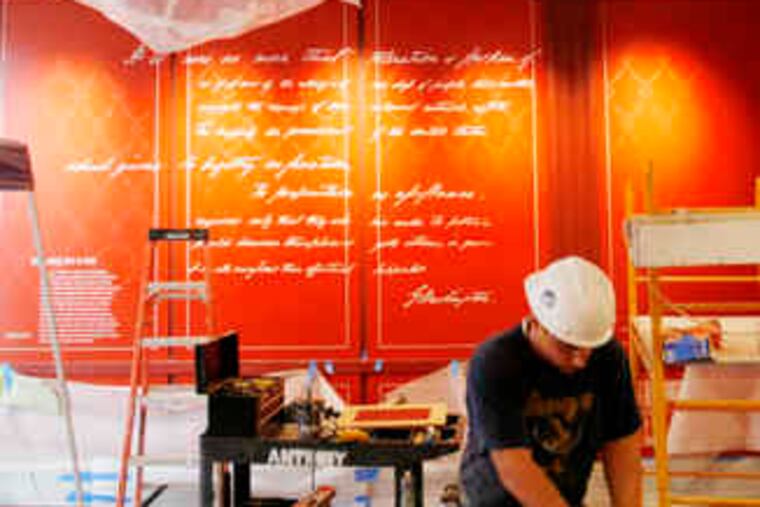PhillyDeals: Fund-raiser doubles as a museum prelaunch
Dean Adler of Lubert-Adler Partners L.P., Northern Liberties redeveloper Bart Blatstein, condo builder Carl Dranoff, mall owner Ronald Rubin, and 400 other Philly real estate moguls jammed the fifth-floor ballroom Wednesday night at the massive National Museum of American Jewish History.

Dean Adler
of
Lubert-Adler Partners L.P.
, Northern Liberties
redeveloper Bart Blatstein
,
condo builder Carl Dranoff
,
mall owner Ronald Rubin,
and 400 other Philly real estate moguls jammed the fifth-floor ballroom Wednesday night at the massive
National Museum of American Jewish History
.
The fund-raiser of the Jewish Federation Real Estate Group was also a prelaunch party for the $150 million museum.
Keystone Property Group Inc. owner William H. Glazer broadcast Adler's somber view of the weak property market: "Dean opined that this is a nine-inning game, and we're still in the third inning."
Glazer quickly went to work getting the crowd to think less about weak sales and more about open wallets. The federation raises $40 million a year for Jewish programs in Israel and around Philadelphia. Glazer urged the real estate men (mostly) to pledge via BlackBerry so he could project their totals on the walls: $25,000 from Intech Construction Inc., $10,000 from Vineland landlord Sandy Brown, $5,000 from David J. Adelman's Campus Apartments Inc. And many more.
Meanwhile, backers introduced the museum, still under construction. "This is going to be one of the world-class facilities in one of the premier locations in the country to deliver our message," Adler told the crowd.
Rubin, boss at Pennsylvania Real Estate Investment Trust, told how backers got ahold of the historic Fifth and Market Streets site, near Mikveh Israel synagogue, whose congregation traces its roots to colonial days. Rubin credited Parkway Corp.'s Joseph Zuritsky with discovering the former KYW-AM studio building was for sale.
"We jumped on it, but by the time we got information, the property was already sold," said Rubin. The buyer was developer Ravi Chawla, whose client "turned out to be an Orthodox Jew. Talk about luck," Rubin said. "When he found out what our concept was, he agreed to give us the [sale] contract at his price," $9.5 million, with no premium.
"As Jews, we are accustomed to thinking about history in thousand-year increments," said museum president Michael Rosenzweig. "As Jews living in this country at this time, we are perhaps more blessed, more free, more prosperous, more influential than at any time anywhere in our history."
The museum will "try to tell the whole story, [including] a much broader mission: to inspire Jews and non-Jews for a deeper appreciation [for] the American immigrant experience," Rosenzweig added. "At its core, it's a story of freedom - a very important story for non-Jews to learn."
Director Steven Spielberg, insurance billionaire Eli Broad, and computer-maker Michael Dell have contributed toward the $125 million raised to date for the building. So has the Delaware River Port Authority. Rubin credited George M. Ross, Goldman Sachs Group Inc.'s retired Philadelphia partner and the museum's chairman, with doing most of the fund-raising "by himself."
The museum is scheduled to open the weekend of Nov. 12.
Urge to merge
"We didn't have to merge," but the sale of
PMA Capital Corp.
, of Blue Bell, to Chicago-based
Old Republic International Corp.
will be better for shareholders "than if we stood alone," PMA boss
Vincent Donnelly
told me Thursday.
Half of PMA's 1,300 workers are based in Blue Bell and other Pennsylvania offices. Donnelly expects PMA to stay in business as a unit of Old Republic. He says most workers will keep their jobs, including him and his managers.
Spun off in the 1990s by the once-powerful Pennsylvania Manufacturers' Association, the business-lobbying group, PMA's attempts to diversify its businesses left mixed results. PMA in the early 1900s pioneered workers' compensation insurance in the state, assuring that injured workers got paid something while also immunizing their bosses from more expensive personal-injury lawsuits. It is now Pennsylvania's third-largest workers' comp carrier, trailing the state-owned State Workers' Insurance Fund and Liberty Mutual.
Old Republic agreed to pay stock worth around $7 a share, or $228 million total, for PMA, pending state approval.